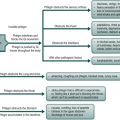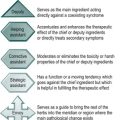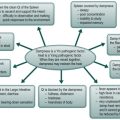11. Syndrome of Kidney-Yang deficiency
Manifestations
Main symptoms
Low vitality, cold limbs and a cold sensation of the back, edema, poor concentration, forgetfulness, irregular menstruation and dysmenorrhea.
Secondary symptoms
Infertility, impotence, spermatorrhea, retention of urine, urinary incontinence, low sexual drive, diarrhea.
Tongue
Pale, dull in color with a white coating.
Pulse
Deep, slow and weak.
Associated disorders in western medicine
Heart or kidney failure, arthritis, dementia, chronic diseases of the digestive system, anemia, hypotension, hypothyroidism, hypoadrenalism, chronic nephritis, infertility, menopause syndrome, impotence.
Analysis of the syndrome
The Kidney-Yang, derived from the pro-heaven Qi, is the root of the Yang in the body as it warms the body, stimulates the Qi movement and water metabolism, promotes the process of Qi and blood generation, promotes all the functions of the Zang and Fu organs and determines the vitality of each individual. Although the Kidney-Yang declines with age, it can be injured in conditions of chronic or severe disease, poor constitution and improper care. In addition, since the Yin and Yang of the Kidney are derived from one root, severe deficiency of Kidney-Yin may cause Kidney-Yang deficiency as well.
• When the Kidney-Yang is weak and is not able to support the other organs, patients may have low vitality, feel sleepy, reluctant to move and tired, and suffer from poor concentration and forgetfulness. Dementia and degeneration may occur earlier than at the average age.
• If the Kidney-Yang is not able to spread the warmth in the body and support the bones, patients may have a cold feeling in the limbs, and even feel cold, weakness and aching of the body, particularly of the back.
• The Kidney-Yang is an important organ for promoting water metabolism. If the Kidney-Yang is too weak to steam the water, to separate the turbid from the clean, edema and retention of urine may appear.
• If the Kidney-Yang fails to warm the Spleen-Yang, diarrhea and cramping of the abdomen may occur.
• Irregular menstruation and dysmenorrhea may appear if the Kidney-Yang is too weak to warm the Lower-Jiao, to stimulate the blood and to maintain the proper function of the Chong and Ren meridians.
• The Kidney-Yang directly influences sexual activity and fertility. If the Yang is deficient, infertility, impotence, spermatorrhea and low sexual drive may present.
• Kidney-Yang deficiency is often shown in a pale and dull color of the tongue with a white, moist coating and a slow, deep and weak pulse, particularly in the third position.
(See Figure 5.5 on page 190 .)
Treatment principle: Tonify the Kidney-Yang and warm the interior
Herb selection principles and formula composition strategies
• First, herbs that are sweet and warm, enter the Kidney meridian, are able to tonify the Kidney-essence and Kidney-Yang are selected.
• Along with these, herbs that are pungent and warm, and can stimulate and spread the Yang, are often used in a small dosage. They can promote the function of herbs that tonify the Yang, spread the warmth in the body and accelerate the water metabolism.
• Herbs that tonify the Kidney-Yin are often selected as the Yin and Yang of the Kidney derive from one origin and they promote each other’s development.
• Herbs that enter the Kidney, strengthen the bones, expel wind, cold and dampness and benefit the back and legs are also often used.
• Herbs that regulate Qi and promote water metabolism are used to reduce the cloying nature of the tonifying herbs, to aid digestion and to make the whole formula more active and effective.
CAUTIONS
1. Protect the Yin:
Herbs that are too hot and too pungent and can stimulate the Yang should not be used as they may injure the Yin, which is the root of the Yang, and they may scatter the Yang quickly and eventually weaken the process of Yang generation.
2. Protect the Spleen:
Herbs that are too heavy and cloying should be used with caution as they can place an extra burden on the Spleen.
Structure of the formula and selection of herbs
Chief: Tonify the Kidney-Yang
Rou Gui ( Cinnamomi cassiae cortex)
Rou Gui is sweet and hot, and enters the Kidney and Liver meridians. It is able to tonify the Kidney-Yang, strengthen the fire of the vital gate, warm the Lower-Jiao and scatter cold there. It is the first choice for treating Kidney-Yang deficiency with many symptoms such as low vitality, tiredness, depression, cold limbs, diarrhea, edema, a weak and cold back, infertility and sexual disorders. Although it is sweet, it is quite hot, and the tonifying function is weaker than the Yang stimulating function, all of which may lead to the side effects of injury to the Kidney-Yin and scattering of the Kidney-Yang. Thus the dosage of Rou Gui should be low in the normal range.
Bu Gu Zhi ( Psoraleae fructus)
Bu Gu Zhi is bitter, pungent and hot, and enters the Kidney and Spleen meridians. It can forcefully strengthen the Kidney-Yang. This herb is able not only to stimulate the Yang, but also to stabilize the Yang because it has an astringent taste. It is particularly suitable for use in the situation where a leakage of the essence exists due to Yang deficiency, such as in chronic diarrhea, spermatorrhea, frequent urination and enuresis.
Ba Ji Tian ( Morindae radix)
Ba Ji Tian is pungent, sweet and slightly warm, and enters the Kidney meridian. The strong point of this herb is that it can tonify either the Kidney-essence or the Kidney-Yang. As it is warm yet not dry in nature, it can tonify the Kidney-essence without any cloying side effect. It is suitable for use as a chief herb in the formula to treat infertility and menopause syndrome that are caused directly by both Kidney-essence and Kidney-Yang deficiency. In addition, as it can strengthen the bones and tendons and expel the wind and dampness, it is suitable for treating arthritis in elderly people and after the menopause.
Deputy: Scatter cold and spread the warmth; tonify the essence in order to tonify the Yang
Xiao Hui Xiang ( Foeniculi fructus), Fu Zi ( Aconiti radix lateralis preparata)* and Gan Jiang ( Zingiberis rhizoma)
These three herbs are all pungent and warm. They have no function in tonifying the Kidney-Yang, but they can stimulate the Yang. They are selected in the formula for scattering cold in the Lower-Jiao in order to aid the growing of the Kidney-Yang. Xiao Hui Xiang particularly warms the Kidney, Gan Jiang is able to warm the Spleen and Fu Zi is able to spread the Yang in all the meridians as it is very pungent and hot and its action is very quick and powerful. These herbs can also be selected to relieve pain and cramp of muscles and tendons from cold obstruction and contraction, such as abdominal pain and dysmenorrhea.
Shu Di Huang ( Rehmanniae radix praeparata) and Gou Qi Zi ( Lycii fructus)
These two herbs are able to tonify the Kidney-essence and blood. Normally they are used in the formula to tonify the Yin, the essence and blood. Since the essence is the material basis of the Kidney-Yang, in a formula that tonifies the Kidney-Yang a large amount of herbs that tonify the Kidney-essence should be used to provide a sufficient supply for Yang development.
Assistant: Strengthen the bones, stabilize the Kidney-essence, expel wind, cold and dampness, stimulate and accelerate water metabolism and eliminate dampness, regulate the Qi
Du Zhong ( Eucomniae cortex) and Gou Ji ( Cibotii rhizoma)**
These two herbs are warm in nature and enter the Kidney meridian directly. They are able to tonify the Kidney-Yang. They have a strong point of strengthening the bones, and are often selected to treat a cold and weak back and limbs. Du Zhong is also able to tonify the Kidney, calm the fetus and prevent habitual miscarriage.
Tu Si Zi ( Cuscutae semen) and Sha Yuan Zi ( Astragali complanati semen)
These two herbs are able to tonify the Kidney-Yang. Their strong point is that they are quite gentle in temperature and can tonify either the Yang or the essence. As they do not have a cloying nature, they can be used for a long period of time. They are often used in the formula to treat infertility in men.
Xian Mao ( Curculinginis rhizoma) and Du Huo ( Angelicae pubescentis radix)
These two herbs are warm and pungent, and enter the Kidney meridian. They do not tonify the Yang or stimulate the Yang of the Kidney, but they can expel wind, cold and dampness in the Kidney meridian. Therefore they can assist the Yang growing and spreading in the Lower-Jiao. They are particularly useful in formulas that treat chronic Bi syndrome and where the Kidney is weakened with time. In such cases, patients suffer from pain particularly in the lower part of the body, such as arthritis of the back and legs in elderly people and after the menopause.
Wu Yao ( Linderae radix)
Wu Yao is pungent and warm, and enters the Lung, Spleen, Kidney and Bladder meridians. It is able to warm the Kidney, stimulate the Qi and scatter the cold there. It is an important herb for relieving pain in the lower abdomen or the lateral sides of the lower abdomen due to Qi stagnation from cold and dampness obstruction. It can be used when the Kidney fails to steam fluid and to separate the clear from the turbid. The common symptoms are frequent urination and enuresis.
Sha Ren ( Amomi xanthioidis fructus) and Fu Ling ( Poria)
Since the herbs that tonify the Kidney, and particularly tonify the essence, are cloying in nature, herbs such as Sha Ren, which enters the Kidney meridian, should be used to promote the Qi movement in the Middle- and Lower-Jiao.
Fu Ling is neutral and bland. On the one hand, it may reduce the Qi stagnation in the Middle-Jiao as it has a descending tendency; on the other hand, it can increase urination and leach out dampness, which is caused by slower water metabolism.
Examples of classical formulas
You Gui Wan (Restore the Right Kidney Pill) 
Source: Jing Yue Quan Shu 
Composition
Lu Jiao Jiao ( Cervi cornu gelatinum)** 120 g
Rou Gui ( Cinnamomi cassiae cortex) 60–120 g
Fu Zi ( Aconiti radix lateralis preparata)* 60–180 g
Shu Di Huang ( Rehmanniae radix praeparata) 240 g
Shan Yao ( Dioscoreae rhizoma) 120 g
Shan Zhu Yu ( Corni fructus) 90 g
Gou Qi Zi ( Lycii fructus) 120 g
Tu Si Zi ( Cuscutae semen) 120 g
Du Zhong ( Eucomniae cortex) 120 g
Dang Gui ( Angelicae sinensis radix) 90 g
Analysis of the formula
This formula was devised by the ancient physician Zhang Jing Yue. It treats Kidney-Yang deficiency.
• Lu Jiao Jiao and Rou Gui are the chief herbs. They can directly tonify the essence and Yang of the Kidney.
• Fu Zi, as one of the deputies, can stimulate the Yang and scatter cold in the Lower-Jiao, thereby stimulating the growth of the Yang.
• Shu Di Huang, Shan Zhu Yu, Tu Si Zi, Gou Qi Zi, Dang Gui and Shan Yao also serve as deputies. They tonify the essence and the blood and provide the material basis for Yang development.
• Du Zhong is another deputy. It particularly strengthens the back and benefits the bones.
Commentary on strategies
In this formula, as in the formula Zuo Gui Wan, there is no herb to regulate the Qi and reduce the cloying nature of the tonifying herbs. This is a specific feature of formulas composed by Zhang Jing Yue – to focus on the main syndrome and treat it intensively. In clinical practice, it is better to include some of the herbs that regulate the Qi, particularly in conditions of Spleen deficiency.
Note
Commentary on Zuo Gui Wan (Restore the Left Kidney Pill) and You Gui Wan (Restore the Right Kidney Pill)
Zuo Gui Wan (Restore the Left Kidney Pill) and You Gui Wan (Restore the Right Kidney Pill) represent the brilliant concept of the ancient physician Zhang Jin Yue in the philosophy of tonifying the Kidney-Yin and Yang.
• First, no matter whether tonifying the Yin or tonifying the Yang, the most commonly used herbs in the formula are herbs that tonify the Kidney-essence. Because essence has the material form of Yin and has the warm and burning nature of Yang, it is the root of both Yin and Yang.
• Second, in the procedure of tonifying Yin, large amounts of herbs to tonify the essence and small amounts of herbs to tonify the Yang are used, so as to promote the Yin growing.
• In the procedure of tonifying the Yang, although quite a few herbs to stimulate the Yang are used, there is still a large amount of herbs to tonify the essence.
These two formulas are good examples for studying the strategies of tonifying the Kidney-Yin and the Kidney-Yang.
Shen Qi Wan (Kidney Qi Pill from the Golden Cabinet) 
Source: Jin Kui Yao Lue 
Composition
Shu Di Huang ( Rehmanniae radix praeparata) 240 g
Shan Zhu Yu ( Corni fructus) 120 g
Shan Yao ( Dioscoreae rhizoma) 120 g
Fu Ling ( Poria) 90 g
Ze Xie ( Alismatis rhizoma) 90 g
Mu Dan Pi ( Moutan cortex) 90 g
Fu Zi ( Aconiti radix lateralis preparata)* 30 g
Gui Zhi ( Cinnamomi cassiae ramulus) 30 g
Analysis of the formula
This formula contains eight herbs. It generates the Kidney-Yang in a gentle and steady way. The formula can be divided into two groups.
The first group contains all the herbs except Fu Zi and Gui Zhi. This group is used to tonify the Kidney-Yin in order to provide a base of Yang growing. It can be subdivided into two further groups:
• In the group of chief herbs, Shu Di Huang tonifies the Kidney-Yin and essence, Shan Zhu Yu tonifies and stabilizes the Liver-Yin and Shan Yao tonifies and stabilizes the Nutritive-essence of the Spleen.
• In the group of assistants, three reducing herbs are used to correct the side effects of the chief herbs. Ze Xie eliminates the turbid water from the Kidney as Shu Di Huang has a cloying nature that may retain water in the process of tonifying the Yin. Mu Dan Pi eliminates constrained heat from the Liver because the sour and warm Shan Zhu Yu may generate and keep constrained heat in the Liver in the process of tonifying the Yin. Fu Ling may remove dampness from the Middle-Jiao as the astringent Shan Yao may retain dampness.
In the second group, on the base of the Yin-tonifying herbs, a small amount of Fu Zi and Gui Zhi are used to gently stimulate the Yang and promote the Yang and Qi growing in the body.
Commentary on strategies
• The relationship of Yin and Yang of the Kidney is again considered carefully in the composition. A small dosage of warm herbs is used to prevent the side effects of consuming the Yin and scattering the Yang, but herbs that tonify the Yin and stabilize the essence are used in large dosage.
• Unlike You Gui Wan (Restore the Right Kidney Pill), which intensively tonifies the Yang without using any reducing or balancing herbs in the formula, three assistant herbs are used in Shen Qi Wan to reduce the side effects of the chief herbs, allowing this formula to be used for a reasonably long period of time.
Note
Commentary on Shen Qi Wan (Kidney Qi Pill from the Golden Cabinet) and Liu Wei Di Huang Wan (Six-Ingredient Pill with Rehmannia)
Six herbs in Shen Qi Wan and Liu Wei Di Huang Wan are the same and are used for the same purpose of tonifying the Kidney-Yin. According to the time line, Shen Qi Wan was composed first. From the inspiration and understanding of the composition of Shen Qi Wan, Dr Qian Yi later removed two Yang-stimulating herbs from Shen Qi Wan and made a new formula, Liu Wei Di Huang Wan to tonify the Kidney-Yin in treating developmental retardation in children. However, in the formula for tonifying the Yin, there are herbs to tonify the Yang as well, and this principle can be traced to applying Shu Di Huang ( Rehmanniae radix praeparata) and Shan Zhu Yu ( Corni fructus) which have a warm nature.




